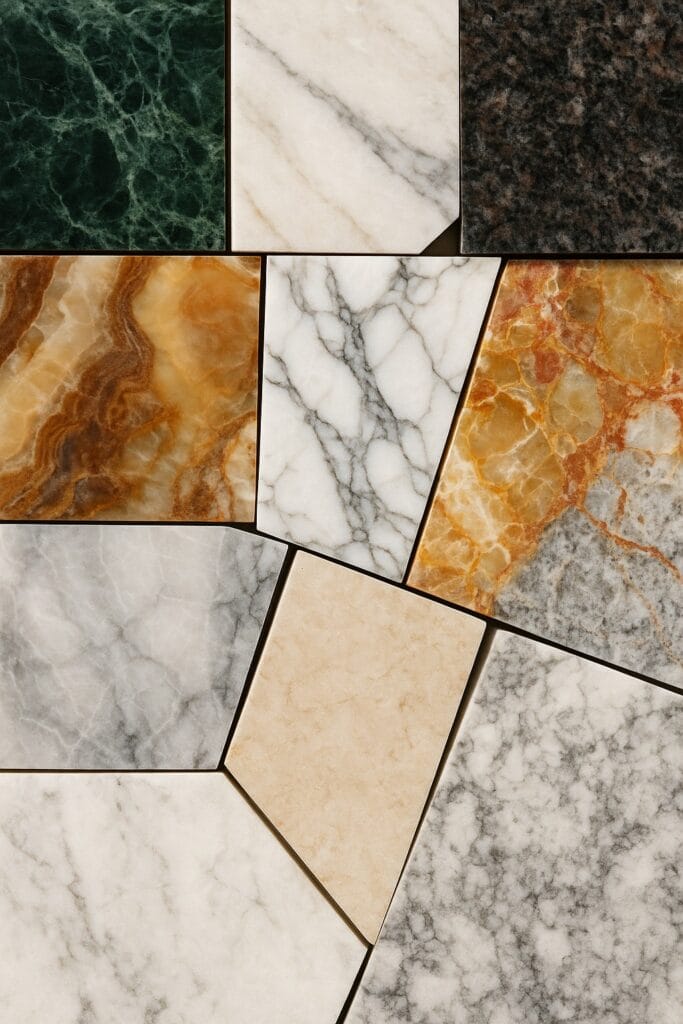Natural stone countertops are a timeless favorite in both residential and commercial design for their luxurious appearance, unmatched durability, and unique natural beauty. Each slab is a geological masterpiece formed over thousands of years and quarried from countries such as Brazil, Italy, India, Turkey, and the United States. Bringing natural stone into your home means incorporating a piece of Earth’s ancient history into your design, with rich textures and colors that no synthetic surface can duplicate.
Fissures vs. Cracks: Know the Difference
A common concern with natural stone surfaces is the appearance of small lines or separations. These are often fissures, not actual cracks. Fissures are naturally occurring and part of the stone’s formation, typically harmless and structurally sound. On the other hand, cracks are caused by impact, stress, or poor installation and may require repair. Understanding this distinction can save time, money, and worry—fissures add character, while cracks may need professional attention.
The Importance of Sealing Your Natural Stone
Natural stone is porous, meaning it can absorb liquids if not sealed. Sealing forms a protective barrier that prevents staining from substances like oil, wine, coffee, and acidic foods. Stones such as granite and quartzite are less porous and need sealing less frequently, while marble, calcite, and onyx require more routine maintenance. Depending on the stone type and usage, resealing should be done every 6 to 24 months. A well-sealed surface is easier to clean, resists moisture, and prolongs the life and appearance of your countertop.
Heat Resistance: Which Stones Can Take the Heat?
Natural stone countertops are known for their ability to withstand high temperatures, making them ideal for kitchen environments. Here’s how common materials compare:
- Granite – Highly heat-resistant; perfect for placing hot pots and pans.
- Quartzite – Equally resistant, combining beauty with durability.
- Marble & Dolomite – Moderately heat-resistant but can suffer from thermal shock or surface dulling.
- Calcite & Onyx – More delicate and sensitive to extreme heat; not recommended for direct heat exposure.
Even with heat-resistant stones, using trivets or hot pads is a best practice to preserve surface polish and prevent long-term wear.
Chipping and Surface Vulnerabilities
While natural stone is strong, chipping can occur, particularly along edges and corners. Softer stones like marble, calcite, and onyx are more susceptible, while granite and quartzite offer superior chip resistance. Fortunately, most chips can be repaired using color-matched resin or epoxy. Thanks to the stone’s natural veining and variation, these repairs often blend in almost invisibly.
Pattern Matching & Seamless Repairs
One major advantage of natural stone over manufactured materials is its ability to disguise imperfections. Because of the “busy” patterns, bold veining, and varied coloration, minor repairs, chips, or blemishes are easier to hide. This makes natural stone a forgiving choice for high-traffic kitchens, where occasional mishaps are inevitable.
Natural Stone and Bacteria Resistance
When properly sealed, natural stone surfaces do not harbor bacteria or mold. A sealed countertop creates a non-porous barrier that prevents bacteria from penetrating the surface. Regular cleaning with mild, pH-neutral soap or stone-specific cleaners keeps the area sanitary and food-safe, making natural stone a hygienic choice for kitchens and bathrooms alike.
A Closer Look at Popular Natural Stone Types
Here’s a breakdown of the most popular natural stones and their unique traits:
Marble
- Elegant and timeless with soft veining.
- Softer and more porous—best for bathroom vanities or low-traffic kitchens.
- Requires regular sealing and care to avoid etching or staining.
Granite
- One of the hardest natural stones available.
- Highly durable, scratch-resistant, and heat-tolerant.
- Great for high-use kitchens and available in a wide array of colors.
Quartzite
- Looks similar to marble but is significantly harder.
- Heat and scratch-resistant, making it ideal for busy households.
- Requires sealing but holds up exceptionally well over time.
Dolomite
- A beautiful alternative to marble with subtle gray and white tones.
- Slightly harder than marble but still more delicate than granite.
- Requires sealing and caution against acids and heat.
Calcite
- Often features stunning translucence and natural crystal patterns.
- Very soft and porous; best for decorative elements rather than busy kitchens.
- Requires frequent sealing and gentle care.
Onyx
- Luxurious and dramatic, with vivid color and translucence.
- Often used in statement pieces like bar tops or backlit panels.
- Extremely delicate—best for low-traffic or decorative areas.
Final Thoughts: Why Choose Natural Stone?
Choosing natural stone countertops is an investment in beauty, function, and uniqueness. While it may require sealing and a bit of care, the benefits far outweigh the maintenance. From heat resistance and repairability to its naturally hygienic surface and unmatched aesthetics, natural stone delivers enduring value. Whether you’re drawn to the veining of marble, the rugged strength of granite, or the subtle sophistication of dolomite, there’s a perfect stone to match your space and lifestyle.
Want help choosing the right stone for your project or learning how to care for your existing countertops?
Contact us today or explore our showroom for a hands-on look at the beauty of natural stone.
Stone Wills Inc., 1315 North Shore Drive, Leesburg FL 34748 contact us at stonewillsinc@gmail.com visit our website: stonewillsinc.com


